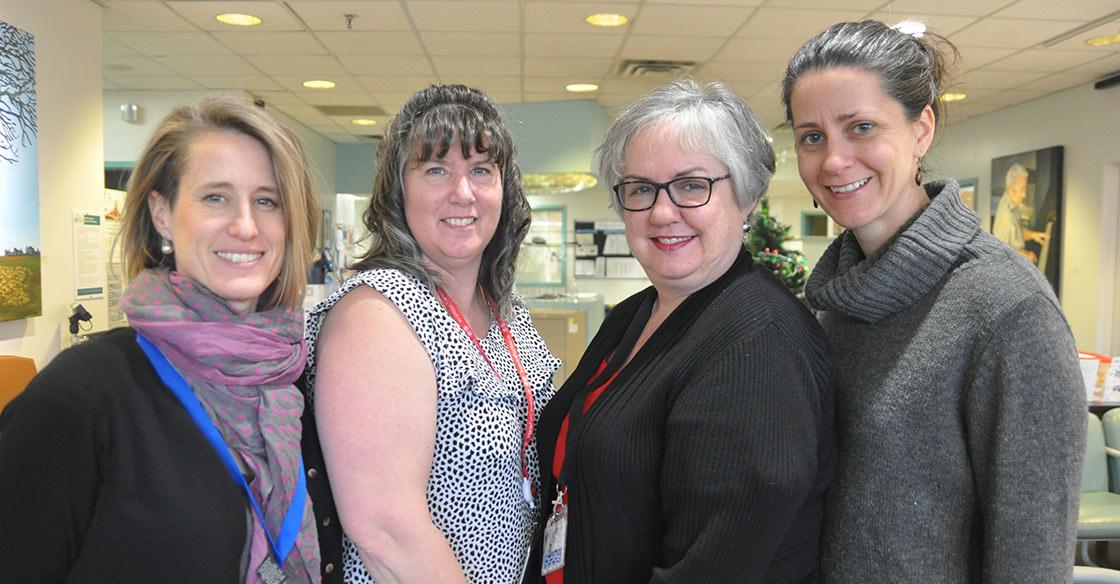
The QEII’s Geriatric Ambulatory Care and Memory Disability Clinic community outreach program works with seniors in their homes. The team includes (L-R): Jody Wells, RN geriatric outreach nurse; Theresa Kroeger, booking clerk; Sandra Hiscott, clinic charge nurse; Kate Newton, clinic nurse, RN; and Terri Buckland (missing from photo), RN geriatric outreach nurse.
New QEII outreach program providing in-home care for memory clinic patients
Originally published on qe2times.ca.
Note to readers: A pseudonym has been used in this article to protect the patient’s identity.
It was after the death of her husband that Mary Jones and her family noticed her difficulty with daily tasks at home.
After Mary was assessed at the QEII Health Sciences Centre’s Geriatric Ambulatory Care and Memory Disability Clinic and diagnosed with dementia, her family realized within six months that she would no longer be able to live at home unless they could find a support system for her.
Mary then became one of the first people referred to the clinic’s newly launched community outreach pilot project, which brings the clinic to seniors like her at home, while ensuring their health is regularly assessed.
“The notion of in-home care is an essential one and better for the patient, who gets to stay where they are comfortable. The project is helping make the best of a difficult situation — we’d be in a much different place without it,” says Mary’s family member.
The QEII’s Geriatric Ambulatory Care and Memory Disability Clinic is where seniors aged 65 and older are referred to receive a geriatric assessment. Clinic charge nurse Sandra Hiscott says the comprehensive assessment examines areas including memory testing, the patient’s physical health, social and living situation, alongside input from family, to determine whether they have a form of dementia.
It became clear that reaching people at home would help on many levels. – Terri Buckland
The clinic’s pilot program began in February 2019 after registered nurses Terri Buckland and Jody Wells wondered whether home visits would better serve certain patients, while also increasing access for seniors not able to reach the clinic.
“We ended up not only increasing access and reaching people who’d never been seen by geriatrics but also serving current clinic patients even better with follow ups at home that fall within the scope of nursing,” says Terri.
“We also heard from families who lived away and those who could no longer transport loved ones to the clinic,” says Terri. “It became clear that reaching people at home would help on many levels.”
Following Jody’s first visit to see Mary, she identified the need for an occupational therapist and connected her with the clinic’s geriatric OT specialist, Catherine-Anne Murray. Mary’s family was also connected with continuing care and respite services, as well as an ambulance call system.
Terri says connecting patients to the right services is a vital part of the program, as families or caregivers are often not aware of the care options available to them.
“A lot of people don’t know about these services, or need help navigating the system,” she says.
Mary’s family credits the diligent work of the outreach clinic for enabling her to remain at home. The family’s stress was also relieved, as they received education from Jody on how to approach daily interactions with someone who has dementia.
Mary’s family continues to feel comfortable calling Jody or Terri with any questions and Mary, herself, feels comfortable asking questions when care providers visit her home.
“It helps her peace of mind to talk to the people helping her to understand why she is monitored,” says Mary’s family.
Terri says the project’s biggest outcome has been helping patients with dementia live at home longer by helping them access interventions.
“It’s a matter of putting in the right interventions at the right time to help people stay home longer,” she says.
Jody and Terri are now collecting and analyzing data from the pilot project to present once the pilot has ended. Jody says family feedback has been positive, and feels the number of visits completed in the community will be reflected in a positive impact on the clinic waitlist.
Mary’s family says the pilot project moved their situation from one that was not feasible to one that now is, and Mary’s life would not be the same without it.
“It’s very difficult for a family to go through the changes of dementia, where your loved one essentially becomes someone else. The team has helped us understand and cope with what’s happening and that’s really meant everything to us.”